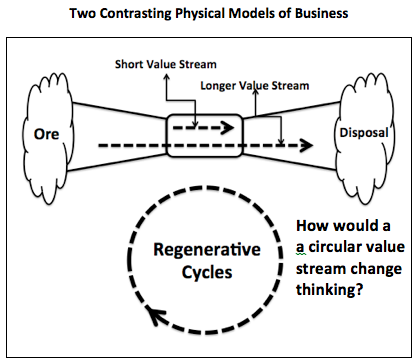This episode is intended to illustrate one of the principles of Compression Thinking, economy of learning over economy of scale. This principle helps us escape the trap of Industrial Age thinking, which we have to do for two reasons. One is that technology may nudge us toward more collaboration. Second, and more important, coming face-to- face with the limitations of a finite planet may force us to act more knowledgeably.
The figure above shows a “bow tie” model of a business, which has a central knot with material coming in and material going out. A bow tie has many processors like factories, warehouses, and service centers, and each of the knots sees itself as the center of the same bow tie. Few companies know in detail whence things come or where they go. Even service companies that process mostly paper have a bow tie, and companies that think of themselves as information companies likewise presume many bow ties because many pieces of equipment are needed to gather information and transmit it (think broadcasting or movie companies).
The other concept of a business is as a circle like the regenerative cycles of nature. Most of those occur locally, although some animals’ regenerative cycles include very long migrations. Few businesses think of themselves as a regenerative cycle. The first example that usually pops to mind is an organic farm.
The value streams in the bow tie are from lean operations. Some are long and some are short, but all tend to be linear. Value streams are supposed to add value at each stage.
A circular value stream throws linear value stream thinking for a loop. What’s the value in going around a cycle?
Nature’s regenerative cycles throw off value of a sort to all participants in a cycle. At a minimum, they get to exist long enough to fill their role in the life cycle. Indeed, nature consists of interlocking cycles, so it appears very complex. Some form of life captures any tiny sliver of energy that might be available in the cycle.
But what might this mean for a company? In a physical sense, it means re-use, re-manufacture, recycle – the R’s that are a mantra in environmental meetings. Many companies are looking to do their best to recycle in a sensible way, with many investing in baler machines from places like phswastekit.co.uk in order to manage their waste better. For example, some carpet companies recycle nearly all the nylon carpet that they sell. Interface was a pioneer, and now bigger producers like Shaw are on the same track. Quality in this sense is delivering value all the way around a cycle, to all stakeholders, and one of them might be thought of as the environment.
However, they cannot do this alone. Field installers have to send re-useable carpet back, meaning that carpet with mud ground in probably can’t recycle, and the nylon suppliers have to actually re-process the end-of-life carpet. That is, a full cycle includes a number of participants, not least the user of the carpet.
On a broader scale, Sekisui Housing in Japan is now able to recycle nearly all the materials if they take down a house that they built. You can read an extensive case on Sekisui here. Although Sekisui occupies a key integrative role in that cycle, they do not do it all themselves. Many other organizations have to actually recycle returned material. Sekisui is only a key driver in a big cyclic network to make that happen.
But to keep improving the cycle, process learning is necessary, and from all stakeholders in the cyclic process. The term stakeholder comes from “bow tie” business. The term stakeholder sounds like stockholder, and stockholders financed voyages of discovery when Europeans were exploring the earth. Each stockholder was entitled to a proportionate share of the riches when their ship came in. Of course, some never returned to port so investors placed bets.
Turn the bow tie into a learning cycle, and all stakeholders need some role in the learning process. The exchange value from learning can’t be obtained by passive people because it is not a money exchange.
Business today remains very investor oriented, but to earn revenue it emphasizes the customer so that the phrase “consumer culture” needs little explanation. By this thinking, giving customers what they want is success. Investors in companies with loyal customers may anticipate a higher return on their investment, but getting customer feedback can be a pain. Investors, customers, and other stakeholders remote from each other try to compensate by communicating indirectly, often by summarizing in data.
This thinking is deeply embedded in bow tie business, so developing ourselves to think by a cyclic model is a difficult transformation. More about that in future updates.

